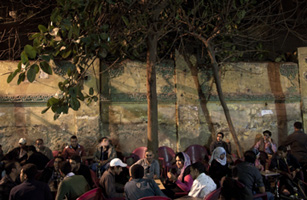
To listen to Kamal Habib extol the democratic ideal is to slip into a parallel universe where down is up and black is white. This is, after all, the co-founder of the Egyptian Islamic Jihad, who was jailed for years — some of them alongside his classmate from university Ayman al-Zawahiri, now al-Qaeda’s No. 2 — for allegedly helping organize the assassination of President Anwar Sadat. His democratic credentials are, at best, slim. And yet here’s Habib, on the fourth floor of Cairo’s Journalists’ Union, along with a few dozen men sporting long beards and Islamic garb, to discuss plans for a political party. “Most of these men are jihadists who were detained and tortured,” he says. Habib himself was released 20 years ago, and he has renounced the armed struggle. Now they all want to get into politics.
Habib, 53, and his followers are Salafists, adherents of a particularly fundamentalist strain of Islam, and until recently they regarded democracy as un-Islamic. That changed, he says, when the Tahrir Square demonstrations brought down President Hosni Mubarak: “What we’d been trying to achieve for 40 years by force, the people managed to do in 18 days without the use of force.”
It’s tempting to view Habib’s embrace of peaceful, participatory politics as a triumph of democracy. On balance, it’s a good thing that he’s part of the process rather than outside it. For a relative newbie in politics, he’s already quite good in the art of the sound bite, and he has a catchy label for himself: “a modernist Salafist.”
But the values he preaches sound anything but modern. He envisions an Egyptian society governed by a strict Islamic code, in which women stay at home, only a Muslim can be President and punishments are meted out in accordance with Islamic law. The gathering at the Journalists’ Union is “sort of a relaunch or revival of the Islamic Jihad movement,” Habib says. “From a closed ideological movement to a political force.”
That kind of language sends shivers down the spine of many a Tahrir Square revolutionary. Egyptians know too well the brute intolerance preached in Salafist schools across the Islamic world. There have already been reports of Salafist-inspired violence since Mubarak’s exit: women have been harassed in the street; shrines deemed heretical have been burned; extremists in rural central Egypt severed the ear of a Christian teacher they accused of renting an apartment to prostitutes. The Salafists, says Hisham Kassem, a prominent opposition newspaper publisher in the Mubarak era, “are being obnoxious in every way.”
Better get used to it. In the political carnival that is post-Mubarak Egypt, the Salafists are just one of several groups with questionable backgrounds and murky ambitions that aspire to shape Egypt’s future. Their chances of making that happen are not great: with general elections expected in September, to be followed by a presidential contest in November, most of these parties simply don’t have enough time to create a grass-roots organization and win the seats necessary to change anything. But extremist groups have already demonstrated that joining the political process doesn’t mean they will curb their violent and disruptive behavior; how they will respond to failure at the ballot box is anybody’s guess.